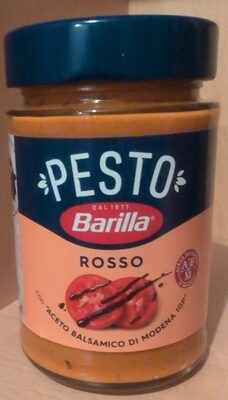
Barcode: 8076809523547
Pesto Rosso
HARAM
📝 Reason: This product contains strictly prohibited substances according to Islamic law. Consumption is forbidden as it violates clear Quranic dietary restrictions for observant Muslims.
🏷️ Category: Condiments, Sauces, Pestos, Cooking Sauces, Red Pestos, Groceries
📄 Certificates: No Gluten, Pdo, Pgi, Fr:Triman
Ingredients:
Details
Understanding the Halal Status of Pesto Rosso
Pesto Rosso, a popular condiment known for its rich and savory flavor, unfortunately, does not meet the Halal dietary requirements as outlined in Islamic law. This post will delve into the specific reasons why this product is deemed Haram (forbidden) for Muslim consumers, exploring its ingredients and E-numbers to provide a comprehensive understanding.
Halal Status Explanation
The primary reason Pesto Rosso is considered Haram lies in the inclusion of certain ingredients that contravene Islamic dietary laws. According to clear Quranic prohibitions, the consumption of any products containing forbidden substances is strictly prohibited for observant Muslims. The presence of lysozyme from egg and Balsamic Vinegar of Modena (which is a wine vinegar) categorically renders Pesto Rosso unsuitable for Halal consumption.
Ingredients Breakdown
Here’s a detailed look at the ingredients found in Pesto Rosso, along with their respective statuses:
- Tomato pulp (37%): Used frequently in various culinary applications, it is botanically a fruit but tends to be used as a vegetable. Status: Permissible.
- Sunflower oil: A common cooking oil that is completely permissible in Islam.
- Tomato concentrate (15%): Like tomato pulp, it is derived from fruit but classified as a vegetable for cooking. Status: Permissible.
- Grana Padano PDO cheese: Made from cow’s milk, this cheese is permissible as it adheres to Halal guidelines.
- Lysozyme from egg: This ingredient raises concerns as it comes from eggs, leading to its Haram status.
- Cashews: A nut that is both delicious and permissible.
- Sugar: A common sweetener without Halal issues.
- Salt: An essential mineral that is permissible in all forms.
- Basil: A fragrant and commonly used herb that aligns with Halal guidelines.
- Balsamic Vinegar of Modena (wine vinegar): The use of wine vinegar automatically makes this ingredient Haram due to the alcohol content.
- Cooked grape must (2%): Generally permissible unless it is fermented into alcohol, as noted in Quran 16:67.
- Whey powder (milk): Another dairy product that is permissible in its original form.
- Pecorino Romano PDO cheese (sheep’s milk): This cheese is compliant with Halal dietary laws.
- Rice starch: A permissible ingredient made from rice.
- Garlic: Used for flavoring, although it is often discouraged before prayers; nevertheless, it is Halal.
- Acidity regulator: lactic acid: This additive is acceptable in Islam.
- Natural flavoring (milk): A commonly used flavor enhancer that is Halal.
The Importance of Certifications
While Pesto Rosso may carry labels such as ‘No Gluten’, ‘PDO’, or ‘PGI’, these certifications do not guarantee its Halal status. The presence of ingredients like wine vinegar and lysozyme makes it imperative for Muslim consumers to scrutinize product labels carefully. Being aware of the specific Halal certificates is crucial, and products should be verified for authenticity in compliance with Islamic dietary rules.
Conclusion
In conclusion, Pesto Rosso, despite its appealing taste, falls short of Halal compliance due to its Haram ingredients such as Balsamic Vinegar and lysozyme. The careful examination of every ingredient alongside awareness of Halal principles is essential for observant Muslims. For those seeking alternative condiments, looking for certified Halal products is advisable for peace of mind in dietary choices.
